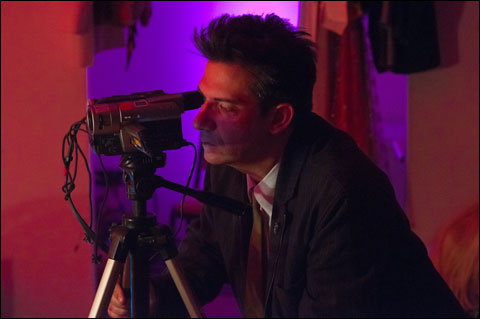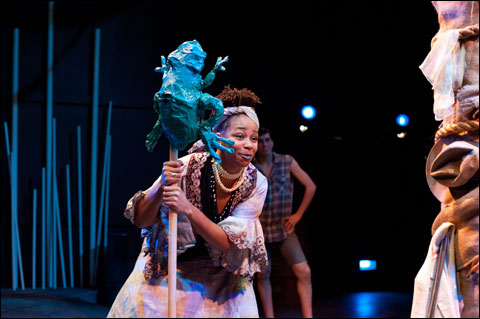 |
"Only connect," advises E.M. Forster, failing to add, "And be weird." John Kuntz, however, hears that double directive, perhaps blowing in the wind, and responds with The Hotel Nepenthe, an intricate connective tissue of danger, desire, and loneliness stretched across the opulent hostelry of the title, itself named for an anti-depressant as old as the Odyssey. The play, in its world premiere from Actors' Shakespeare Project (at the Storefront in Davis Square through March 6), is playwright/performer Kuntz's most complex yet — a far cry from early monologues spoken by guys who like to sit on sugar, though in parts just as funny. Dividing 16 characters among four actors, the La ronde–like work provocatively establishes many dots, letting the lines among them merely flicker. At the end, when one character repeats a wistful mantra about wanting to be at the top of a ferris wheel where everything can be seen clearly, you stop struggling to solve the mystery and get the point that, even when hints are flung as liberally as if by Agatha Christie, we never really do see all clearly.
The play begins and ends at a rental-car agency near the hotel, to which a bellhop has come bearing a mysterious hatbox left behind by a guest named for a character on the television series Bewitched. (This being a Kuntz play, the pop-culture references abound.) The conversation instigated by the "rent-a-car gal" is mostly about the lurid murder of a young woman at the hotel and the abduction of her baby. "Dead babies are hard to find," the girl opines with a macabre wackiness that will recur. "You can stuff them anywhere."
Among the threads in Kuntz's skein: a traveler who sets out to rescue his suicidal lover but ends up having a strange adventure in a taxi; a starlet regaling her paramour with a vivid tale about walking a red carpet through time so that the paparazzi could snap eminences ranging from Jesus to Harriet Tubman; a purple-clad young woman cradling an infant who breaks her nocturnal wanderings to chat with a garrulous cab dispatcher; a political wife who has slipped her powerful husband a mickey before trolling the streets in search of a whore to compromise him; a transvestite fairy; and several car crashes, the sound effects of which go on forever. Parallel universes and time travels are suggested as ways to account for how the random decisions we make can change the course of events.
The associations here are both tenuous and potent (though the circling vignettes do include some quirky set pieces that have little to do with the thread). And David R. Gammons's jumbled dream of a production, unfolding before a series of dressing rooms with bits and pieces captured by a video camera, is both theatrical and elusive (the elusiveness compounded by a crappy playing space in which it's hard to see). Moreover, the director/designer has assembled a cast that gets the collision of whimsy and yearning in Kuntz's work almost as well as he does. Marianna Bassham, Georgia Lyman, and Daniel Berger-Jones juggle their dodgy and haunted characters as smoothly as they do their outfits and wigs. Then again, on opening night, when Kuntz, in the last of his four roles, uttered the deadpan line "There is no one like me," one could understand the applause that broke out in the house.
 |
Rest assured that Derek Walcott did not win the Nobel Prize for Ti-Jean & His Brothers, a pleasant little dip into Caribbean folk culture from 1957. But as revived by Underground Railway Theater and Playwrights' Theatre at Boston University (which poet/playwright Walcott founded 30 years ago), the theater piece (at Central Square Theater through March 13) proves an infectious lesson in dealing with a devil who's part white colonialist and part cloven-hoofed demon. And when said incubus — a role that's tossed from actor to actor like a football — falls into the hands of Ramona Lisa Alexander, Walcott's West Indian fable, which has been a bit broad and amateurish, bristles. Alexander's magisterially irked, roaring-drunk devil may have you rooting against the lovable, laid-back Ti-Jean!
Like the author's Obie-winning Dream on Monkey Mountain, Ti-Jean derives from the folk tales of Walcott's native St. Lucia. URT and Playwrights' Theatre, however, drape the inspirational fable — with its message of hope rooted in cooperation and common sense — in Haitian-inspired finery to commemorate the victims of last year's earthquake. The duds fit well enough, from Sara Ossana's imaginative set built around a towering rope-and-burlap palm to music director Kera Washington's percussive, mood-setting accompaniment.
"Krik? Krak!", the show begins, utilizing a Haitian way of signaling the onset of storytelling. In this case, the tale is passed among a quartet of Caribbean forest dwellers: a frog, a bird, a cricket, and a firefly. It begins with an ominous visit by a horned if diminutive dybbuk to a poor widow and her three sons. "Un, deux, trois," the demon pronounces, prophesying that the devil will make meals of all three young men. The first to seek out the fiend is Gros Jean (Hampton Sterling Fluker, bringing Shakespearean diction to the patois), known for his "arm of iron." The challenge is to vex the imperialist plantation owner of a devil, who evidently wants to feel human. If he vexes you, however, with his Sisyphean tasks and racist goading, you're lunch. Gros Jean tries to beat the devil with strength, the smug but impractical Mi-Jean (Cedric Lilly) with learning gleaned from European books. But it takes Kervin George Germain's sunny Ti-Jean, innocent if hardly guileless, to get Satan's goat.
Megan Sandberg-Zakian's production, with its bright bursts of poetry and catchy tunes by Walcott and Trinidadian composer André Tanker, is both lyrical and childlike. The actors, both those portraying humans and those fitted out with critters' masks or carapaces, all sing and play snatches on musical instruments. Some do so more professionally than others. Several get their turn to operate the devil's boot-and-bauble-accessorized wheelchair and lasciviously lick the hat of a victim obliterated in a flash of light and voodoo powder. I admit I was slower to warm to Walcott's political fable than to its Caribbean trimmings. But Alexander's devil made me do it.